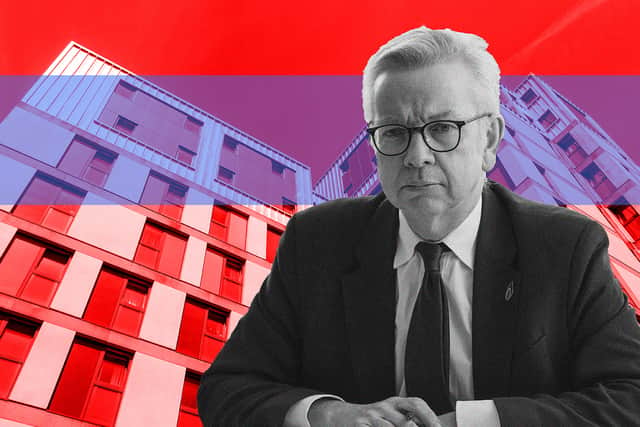Post-Grenfell fire cladding crackdown: developers must commit to fixing safety defects or face ban, says Gove
This article contains affiliate links. We may earn a small commission on items purchased through this article, but that does not affect our editorial judgement.
and live on Freeview channel 276
Michael Gove has told developers that they must commit to fixing fire safety defects in high-rise buildings or face being banned from the housing market.
The Levelling Up Secretary warned that companies have the next six weeks to sign contracts which will oblige them to address post-Grenfell fire safety concerns in any tower blocks they have built over the last 30 years. Those who do not meet the deadline of 13 March will be blocked from any further development - even on schemes which have already secured planning permission.
Advertisement
Hide AdAdvertisement
Hide AdThe MP explained in a statement in the House of Commons: “If you’re a developer [and] you fail to sign this contract, you will have to find another line of work.” He added that developers should be “under no doubt” that there will be “significant consequences if they fail to comply with their legal obligations.”
Safety faults in tower blocks were brought to light by the 2017 fire at Grenfell Tower in London, which saw 72 people tragically lose their lives. Inspections of the building found that the fire had spread so rapidly due to the cladding being made from highly flammable material.
The Grenfell Inquiry ultimately concluded then that all 72 deaths were “avoidable”, as the “risks” were “well known by many” - namely, the developers and builders who allowed the dangerous cladding to be put on people’s homes. Richard Millett KC, counsel to the inquiry, also placed some of the blame on poor regulation and inadequate legislation.
Gove’s new plan, the ‘responsible actor scheme’, will require building companies who installed unsafe cladding to urgently replace it with safer material. This will be done at no cost to homeowners, leaseholders or renters, and developers will be required under the contract to reimburse taxpayers for public money already spent on remediating unsafe tower blocks.
Advertisement
Hide AdAdvertisement
Hide Ad

The announcement came just days after the Levelling Up Secretary acknowledged that the government had not sufficiently regulated the industry. He told The Sunday Times: “I believe that [the guidance] was so faulty and ambiguous that it allowed unscrupulous people to exploit a broken system in a way that led to tragedy.”
News of the tougher regulations has been welcomed by many living in unsafe buildings - but some campaigners have lamented that the contracts only apply to high-rise blocks, a.k.a., those over 11 metres in height, meaning those in low-rise buildings are still at risk.
Jennifer Frame, from Richmond House Residents, told NationalWorld: “We are pleased that there is - at last - a hard deadline for developers to sign a legally-binding contract with the government to fix the unsafe buildings they are responsible for. But almost six years since Grenfell, more importantly, we need to see a deadline by which all homes will be made safe.
“We are concerned to hear then that developers will still not be held to account for the unsafe blocks of flats under 11 metres in height that they also built and profited from. If there are no consequences for having built unsafe low-rise blocks, then what will stop this from happening again in the future?”
Advertisement
Hide AdAdvertisement
Hide Ad

In September 2019, Jennifer lost her home when the four-storey flat block she lived in set alight. Like Grenfell Tower, the building was fitted with defective cavity barriers - a safety feature that is supposed to stop fire and smoke spreading through walls.
So despite firefighters arriving on the scene within minutes, and despite the building being classed as ‘low-rise’, nothing could be done and all residents lost their homes. Three and a half years on, the residents of Richmond House are still living in temporary accommodation - and still paying mortgages for their homes which burnt down.
There are many people in similar situations. NationalWorld previously spoke to Lisa Petty, who also lives in a low-rise building, and is facing a bill of up to £30,000 to remove unsafe cladding from her flat because, as the block is less than 11 metres, she does not qualify for government funding.
Lisa commented: “We all saw what happened to Grenfell Tower - and our building has the same material. The government has even admitted how unsafe it is, by banning the use of the material on any new buildings, no matter what the height is. So they’ve recognised that the material is so unsafe it should be illegal, but for those of us already trapped in these buildings, it’s down to us to pay to make our homes safe? When you have material that flammable, it’s unsafe regardless of height.”
Advertisement
Hide AdAdvertisement
Hide AdThe Labour Party has backed the principle of the government’s new plans, but said progress is too slow. Shadow Levelling Up Secretary Lisa Nandy said: “Five years after the Grenfell tragedy only 7% of flats at fire risk have been fixed, and millions are still left with unsellable properties and eye-watering bills.
“People need action not gestures, so Labour will push ministers for hard, urgent timelines for remediation attached to this scheme and further action to ensure fair liability of the winder industry, including the manufacturers of unsafe cladding and insulation.”
Comment Guidelines
National World encourages reader discussion on our stories. User feedback, insights and back-and-forth exchanges add a rich layer of context to reporting. Please review our Community Guidelines before commenting.
